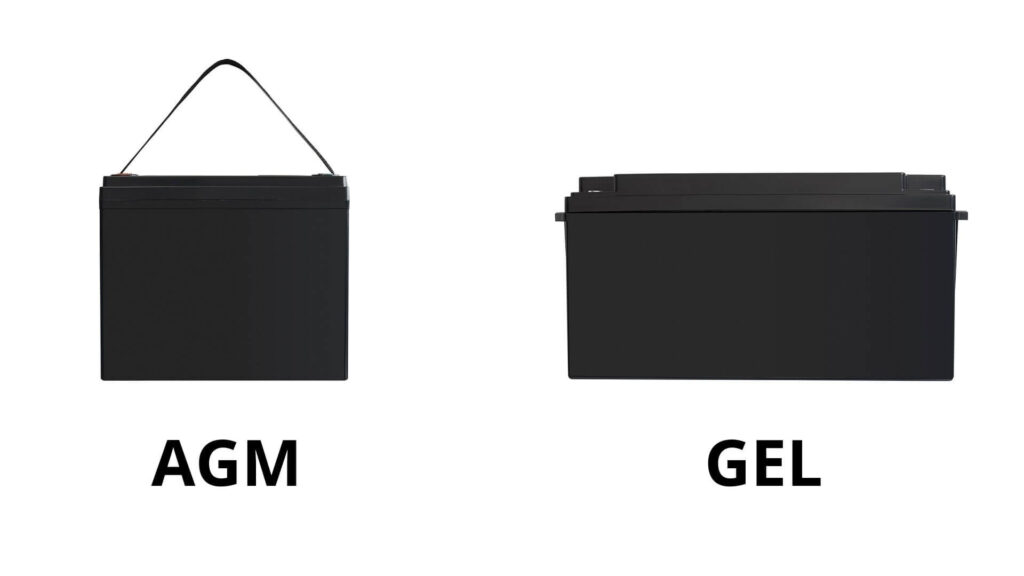AGM batteries and gel batteries are two of the most popular lead-acid batteries on the market today. While both offer advantages and disadvantages, some critical differences should be considered before making a purchase.
What is the difference between GEL and AGM batteries?
There are two main types of lead-acid batteries: flooded (wet) and sealed (dry). Gel batteries are a sealed battery type, while AGM batteries are a type of flooded battery.
The first difference between gel and AGM batteries is how the electrolyte is suspended. In a gel battery, the electrolyte is suspended in a silica gel, while in an AGM battery, the electrolyte is absorbed in a glass mat.
The second difference between gel and AGM batteries is how they are constructed. Gel batteries are typically made with thicker plates than AGM batteries, which gives them a longer life span. However, AGM batteries can withstand more deep discharge cycles than gel batteries.
The third difference between gel and AGM batteries is how they are used. Gel batteries are typically used in applications where a long life span is required, such as standby power systems. AGM batteries are usually used in applications where a high discharge rate is required, such as in golf carts and RVs.
The fourth difference between gel and AGM batteries is the price. Gel batteries are typically more expensive than AGM batteries, but they also have a longer life span.
The fifth and final difference between gel and AGM batteries is the maintenance required. Gel batteries require very little maintenance, while AGM batteries require regular watering.
Advantages of AGM Batteries:
The advantages of AGM batteries over gel batteries include:
- AGM batteries can be discharged at a higher rate than gel batteries, making them ideal for applications where a high discharge rate is required.
- AGM batteries require less maintenance than gel batteries, as they do not need to be watered regularly.
- AGM batteries are typically less expensive than gel batteries.
- AGM batteries are typically lighter than gel batteries, making them easier to transport and install.
- AGM batteries can be used in wider temperatures than gel batteries.
Disadvantages of AGM Batteries:
The disadvantages of AGM batteries over gel batteries include:
- AGM batteries have a shorter life span than gel batteries, as they are not made with as thick plates.
- AGM batteries cannot be used in applications requiring a long life span, such as in standby power systems.
- AGM batteries are more sensitive to temperature than gel batteries, and extreme temperatures can affect their performance.
- AGM batteries are more likely to leak than gel batteries, as the electrolyte is not as well-sealed.
Advantages of Gel Batteries:
The advantages of gel batteries over AGM batteries include:
- Gel batteries have a longer life span than AGM batteries, as they are made with thicker plates.
- Gel batteries can be used in applications where a long life span is required, such as standby power systems.
- Gel batteries are less sensitive to temperature than AGM batteries, and their performance is not as affected by extreme temperatures.
- Gel batteries are less likely to leak than AGM batteries, as the electrolyte is better sealed.
- Gel batteries typically come with a more extended warranty than AGM batteries.
Disadvantages of Gel Batteries:
The disadvantages of gel batteries over AGM batteries include:
- Gel batteries can be discharged at a lower rate than AGM batteries, making them less ideal for applications requiring a high discharge rate.
- Gel batteries require more maintenance than AGM batteries, as they need to be watered regularly.
- Gel batteries are typically more expensive than AGM batteries.
- Gel batteries are typically heavier than AGM batteries, making them more challenging to transport and install.
- Gel batteries can only be used in a limited range of temperatures, as extreme temperatures can damage them.
AGM vs. Gel Batteries: Which is better?
The answer to this question depends on the specific application. For most applications, AGM batteries are a better choice than gel batteries.
However, gel batteries may be the better choice for applications with a long life span. Ultimately, the decision of which type of battery to use should be based on the application’s specific needs.
Conclusion
AGM batteries are better than gel batteries for most applications, as they require less maintenance, are less expensive, and can be used in a broader range of temperatures. However, gel batteries may be the better choice for applications requiring a long life span. Ultimately, the decision of which type of battery to use should be based on the application’s specific needs.

